Trademarks on Facebook and YouTube
Prosecution for
providing assistance in unlawful use of trademarks on Facebook and YouTube
The proliferation of digital hosting platforms has opened up new avenues for advertisers to connect with customers, clients, and investors. Many companies are now using digital hosting platforms and online marketplaces are focusing more on advertising strategies.
In this context, digital hosting
platforms have become powerful players, as they provide digital services for a
variety of services, including e-commerce, Internet search engines, social
networks, and application stores. Provide infrastructure.
A court in Amsterdam recently ruled that the Facebook administration is bound to make appropriate decisions on the display of
advertisements based on counterfeit products on Facebook and Instagram, a
decision PVH Europe made on its own counterfeit products on Facebook and
Instagram. PVH Europe owns well-known brands such as Tommy Hilfiger and Calvin
Klein and faces constant losses due to counterfeit products.
Facebook and YouTube are platforms for advertising
Facebook and YouTube Pad are the two most used platforms for advertising. Facebook has advertising regulations that monitor and approve various advertisements. Regardless of these policies, counterfeit products on both Facebook and Instagram and there are various accounts of intellectual property rights (IPR) violations.
PVH claimed that Facebook should be held accountable
for allowing unauthorized use of PVH trademarks by ministers and
users. As a result of this lawsuit, the court ruled that Facebook should take
the necessary steps to prevent such violations in the future and is held
accountable under the law.
Along with PVH Europe, Louis Vuitton Malletier also faced
opposition to intellectual property rights. In 2006, it was discovered that
several websites were selling Louis Vuitton's copyrighted images, designs, and
trademarks without permission.
Managed Solutions Group, Inc. (MSG) and Akanoc Solutions, Inc. ("Akanoc"), both of whom are in the web hosting business. Louis Vuitton's own intellectual property rights.
Has a very strict policy regarding the unauthorized use of
MSG and Akanoc, so 18 notices were sent to MSG and Akanoc demanding that Louis
Vuitton's intellectual property infringing websites be shut down. Failing to
act, a lawsuit was filed by Louis Vuitton. MSG and Chen were found guilty of
thirteen trademarks and two copyright infringements. Varazi was fined 3 300,000
each.
The lawsuit against Descon Engineering Limited
A similar claim was made by the well-known multinational
company Descon Engineering Limited (Descon) when another private company
infringed on Descon intellectual property rights using Descon's well-known
trademark/service mark. Khurram Chughtai, a lawyer for the consulting firm,
has filed a lawsuit against DCC Developers for trademark infringement, non-transparent
competition and damages.
The lawsuit was filed. Discon was forced to file a lawsuit
against Facebook and YouTube for allowing the unauthorized illegal use of its
trademark. Orders to ban YouTube from providing access to its digital hosting platform.
This was the first decision of its kind in the world to issue a restraining
order against Facebook and YouTube. So far no such decision has been issued
by the government in which anyone has their digital plate the form has been
withheld from advertising and marketing.
Descon has been conducting business in Pakistan and elsewhere
since 1977 with its 43 years of global reputation for various national and international
organizations, including various public sector companies. It has never
compromised on its professional integrity, quality, and transparency. When
contacted, the Facebook administration refused to take action against the
violation, forcing Descon to file a lawsuit.
Influence of social media platforms
With the growing influence of social media platforms such as Facebook
and YouTube, such platforms must be aware of the advertisements offered
on them and also ensure that any the rights of the party should not be
violated. Companies establish their brand reputation after years of hard work
and dedication.
It is very unfair and abusive for these companies to share their equity with other small companies which Already, existing brands are working to make a living. The influence of social media has grown exponentially over the past few years, and social media has a responsibility to prevent intellectual-property violations.
Conclusion:
Failure to protect the intellectual property
rights of companies are extremely damaging and could lead to further litigation
in the future.






